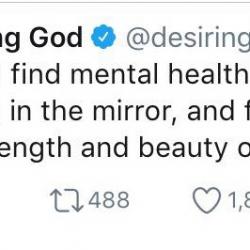“T ell him: Some people say that according to God’s justice, this boy is damned because he took his life. I say it was overcome by the devil. Is this child any more to blame for the despair that overtook him than an innocent man who is murdered by a robber in the woods? God must be mercy. God IS mercy.”
ell him: Some people say that according to God’s justice, this boy is damned because he took his life. I say it was overcome by the devil. Is this child any more to blame for the despair that overtook him than an innocent man who is murdered by a robber in the woods? God must be mercy. God IS mercy.”
The death of Robin Williams, as well as the recent suicide of Braxton Caner, have brought about a number of discussions about the nature of suicide, especially regarding the Christian faith. A number of people have been emphasizing the fact that suicide is a choice, and an extremely selfish one at that (See Matt Walsh’s recent post here for example). Depression, similarly, is a spiritual issue, largely the fault of the sufferer for not having enough faith, not praying enough, etc. This type of theology is extremely destructive. I know because I have lived it.
I have never struggled from depression. But, I have faced extreme anxiety for years. Since I was a child, I can remember having panic attacks, and dealing with irrational fears constantly. This anxiety worsened when I entered adolescence and especially during my high school years. I largely kept my struggles to myself, and part of that was the nature of the people I spent time with. I attended a Christian high school, and it seemed to be a constant refrain that psychology is at its root a secular disciple, and to go to a psychologist or take medication was to make an excuse for, and cover over, the sin of unbelief. I battled constantly with myself, thinking that my faith was not strong enough, or that my prayer life was not what it should be. Of the few close friends who I expressed my struggles to, the majority told me that I had a spiritual problem–perhaps some unrepentant sin I was somehow unaware of.
After years of struggling, I started medication. And to my amazement, it actually worked. Don’t get me wrong, there are many aspects of contemporary psychology which are dependent upon a false materialistic worldview; but that does not negate the usefulness of the disciple in toto. The problem with us psychologically is not simply a physical issue to be sure. It is deeply rooted in the human psyche due to the fall. But the fall effects every area of life. We are usually fine admitting that the fall causes physical problems. Sure, if you are born disabled, that it not your fault but a result of original sin. But… when it comes to mental disorders or sexuality we suddenly become Pelagians. Depression can’t be inborn. Anxiety can’t be inborn. Homosexuality can’t be inborn. But if we truly believe that our birth was corrupted by the fall of man, why wouldn’t we acknowledge that these aspects of human nature have also been affected? Is the mind so divorced from the body that we are only affected outwardly, without any damage to the emotions?
Yes, Robin Williams made a choice–a bad and selfish one, to take his own life. But let’s not pretend that he was somehow just choosing freely in the same way that I picked what I wanted to eat for lunch today. He was afflicted with a terrible psychological disorder–depression. That doesn’t mean that depression always leads to suicide, or that we should give up our own battles against mental anguish; we can get help. But it is the truth that sometimes, the disorder wins out, and we give up.
So why did Robin Williams die? Because of the fall. Because of Adam. Because original sin corrupted his mind and body. It does no good for grieving families to tell them what a terrible person their lost loved one was for taking their own life.











